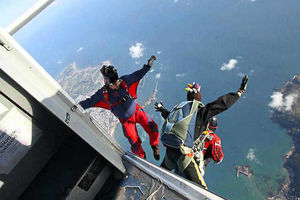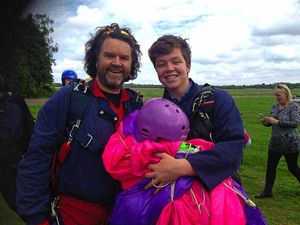What it's like to... Jump out of a plane
After writing about all of the various exciting challenges that you can do for charity, our minds kept coming back to the skydiving experience.

Though marathons, mountaineering and multi-mile marches test people to their limits, they're all things that we can realistically prepare for. Most of us know how it feels to run, or climb.
Falling through the air in excess of 100mph though? How can you ever gear up for something that will be such an alien sensation to you? And what does it really feel like?
We made it our business to find out, and so got in touch with the man that's likely to be strapped to your back if you opt for a tandem dive in Shropshire. Qualified instructor Alex Busby Hicks, 49, has plummeted to earth 4,206 times in his career. He owns the Skydive Tilstock, based in Whitchurch, with his wife Kat. They met when she visited the centre to dive on a hen party – it was love at first drop.
Sometimes Alex jumps up to five times in a day – that's around the same amount of times that we leave our desks to pop the kettle on.
"I'm not going to say it's not scary – you're jumping out of a plane and heading towards the ground at 120 miles an hour, so there is that thrill there!" Alex tells us, as the phone receiver slides around in our sweaty palms.
"But it is my job as club chief instructor to make sure it's as safe as possible, so I always check all the equipment is in good working order."
Alex was in the army for more than 20 years, and learned to dive during his service. For the last six years of his career, he taught sports parachuting to military personnel in Germany and now holds the highest qualifications.
He tells us more about the sport that he has dedicated so much of his life to.
"Freefall is around 35 seconds and you just feel weightless. It's just like being in space except there's wind. The parachute ride to ground takes about five minutes. You get used to it, knowledge dispels fear, as we learned in the army. The more you know about something, the less fearful it is. The 'gear fear', that my parachute isn't going to work, doesn't exist with me now."
What we want to know isn't just how fast you travel, or how far. We want to know how it feels.
"It's like nothing else you'll do. It's not like being on a roller coaster, as it goes I hate roller coasters and I'm scared of heights!" Alex admits.
He's so friendly and warm that we're sure if we ever drum up enough courage to do it ourselves, it'd have to be with him.
"When you fall out of an aircraft, it's just like looking at a map. You don't get that experience of ground rush coming up to you and you don't get that horrible stomach feeling. Roller coasters are all about the sudden changes in direction, dips and turns. Because you're falling out of the sky, there's no stomach-in-your-mouth feeling. You roll out and you're straight into freefall, travelling 120 miles an hour in around five seconds.

"You do get a sense of acceleration and the wind in your face, but it's an amazing experience. I recommend anyone doing it at least once. For that five minutes under the parachute, you live every second. It's such an intense experience.
"Some people do feel travel sick, so if you're the kind of person that gets car sick, then there's a possibility you'll feel sick under the parachute. But if you do, we let you steer the parachute – you don't feel sick if you're in control."
We feel sick thinking about it – that's the worry. What if we went up and then couldn't go through with it?
"We get all sorts of people turn up here, and some are really nervous and crying," Alex explains. "A woman just called about her dive this weekend, saying 'what if I bottle it at the door?' We've had one person do that in the five years I've been chief instructor here.
"Our instructors are really good – they've been doing this for a long time and they're just really good at putting people at ease. They answer any questions people have, make sure they're confident in the knowledge that we do this nearly every weekend, doing thousands of jumps a year, and that we've got a really good safety record."
We ask Alex how he can be so brave as to take the plunge every weekend?
"The perception of skydiving is that it's a dangerous sport for risk-takers and adrenaline junkies. But the sad reality of it is, most of the skydivers I know are quite boring. . ." he laughs. "We're risk averse, not risk takers! We do everything we can to make the sport as safe as possible. In the UK, we've got the best safety record in the world. You can say 'accidents happen' and we do get the occasional broken bone, but people dying when skydiving is a definite exception. We had a fatality-free year last year – no sport skydivers died. And for tandem parachuting, the safety record is fantastic."
So does that mean Alex has never had a close shave? "Parachute malfunctions are par for the course. I've done four and a half thousand jumps and I've had about five or six malfunctions. One in a thousand isn't too bad! When I was quite new to the course, I'd done about 200 jumps, I was out skydiving in California. I broke my ankle. That's pretty much the worst that's ever happened to me. I had to stop diving then for six months. But apart from the occasional malfunction, which you're trained to deal with, it's all pretty good."
Before speaking to Alex, we were convinced that you'd be more likely to see pigs flying than you would to see us falling through the air on a parachute. But after our chat, we're coming round to the idea.
By Kirsty Bosley
If you would like to experience the thrill of freefall yourself, visit www.skydivetilstock.co.uk or call 01948 841111 and quote 'STAROFFER' to save up to £60 on the cost of a skydive. Go, go, go!




